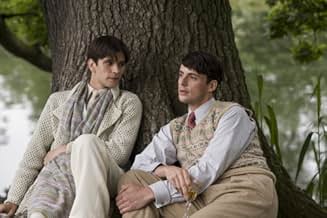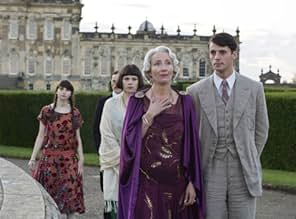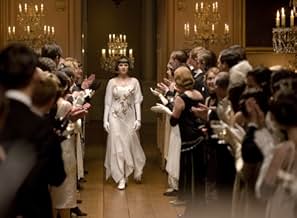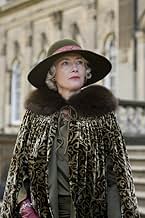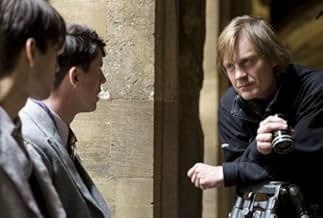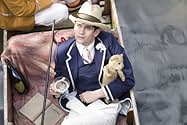CALIFICACIÓN DE IMDb
6.6/10
14 k
TU CALIFICACIÓN
Una conmovedora historia de amor prohibido y la pérdida de la inocencia ambientada en Inglaterra antes de la II Guerra Mundial.Una conmovedora historia de amor prohibido y la pérdida de la inocencia ambientada en Inglaterra antes de la II Guerra Mundial.Una conmovedora historia de amor prohibido y la pérdida de la inocencia ambientada en Inglaterra antes de la II Guerra Mundial.
- Dirección
- Guionistas
- Elenco
- Premios
- 11 nominaciones en total
- Dirección
- Guionistas
- Todo el elenco y el equipo
- Producción, taquilla y más en IMDbPro
Opiniones destacadas
I haven't read Evelyn Waugh's famous 1945 novel or seen Granada's acclaimed 1981 television adaptation. so I approached the story fresh, as indeed will most viewers of this quintessentially England tale of the repressive nature of religion and class. I understand that the adaptation by Andrew Davies and Jeremy Brock has taken some liberties with the original, more subtle narrative, but this is inevitable in a work of just 133 minutes compared to the 11 episodes of the television series.
Directed by the English Julian Jarrold who made "Becoming Jane", the film has many strengths. There are wonderful locations in Oxford, Venice, Morocco and above all Castle Howard in North Yorkshire standing in - as in the television version - as the eponymous country house that is almost a character in itself. The script contains some fine lines - often very cutting and very cruel. Above all, there is some accomplished acting, both from veterans Michael Gambon and Emma Thompson as Lord and Lady Marchmain and newcomers Ben Whishaw and Hayley Attwell as their son Sebastian and daughter Julia and Matthew Goode as Charles Ryder, a young artist who falls in love in different ways with both Sebastian and Julia as well as their home and style.
Sadly, however, ultimately the whole film seems somewhat pedestrian and leaves one feeling strangely cold and disconnected.
Directed by the English Julian Jarrold who made "Becoming Jane", the film has many strengths. There are wonderful locations in Oxford, Venice, Morocco and above all Castle Howard in North Yorkshire standing in - as in the television version - as the eponymous country house that is almost a character in itself. The script contains some fine lines - often very cutting and very cruel. Above all, there is some accomplished acting, both from veterans Michael Gambon and Emma Thompson as Lord and Lady Marchmain and newcomers Ben Whishaw and Hayley Attwell as their son Sebastian and daughter Julia and Matthew Goode as Charles Ryder, a young artist who falls in love in different ways with both Sebastian and Julia as well as their home and style.
Sadly, however, ultimately the whole film seems somewhat pedestrian and leaves one feeling strangely cold and disconnected.
The Granada people got it right in 1979 when they set out to film "Brideshead Revisited." They realized that Evelyn Waugh's great novel could not be done justice in a single film of two or even three hours. It had to be made into an extended mini-series. Thus, the great 11-part TV series of 1981 - the first and only great film version of Waugh's novel.
Yet, in 2008, BBC Films thought it was time for a remake. The result is this film adaptation. It lasts just over two hours. It skims over or skips characters. It changes the focus, and thus the story. It misses the essence of Waugh's story completely. So, it's more proper to call this a major revision - a revised story based on Waugh's novel.
Even Emma Thompson as Lady Marchmain and Michael Gambon as Lord Marchmain can't lift this revised story to an acceptable imitation. Apparently, because the story is so profound, BBC films chose to promote this as a remake of the TV series from Waugh' great novel. That being the case, one is led naturally to comparison. Thus, this film fails.
Still, for some fair acting by the cast, I give it five stars as though it were a different story entirely. After all, the cast can't be held accountable for the plot. Although Thompson's almost muted performance hints that she may realize she's in a far inferior work that has borrowed a great title.
Yet, in 2008, BBC Films thought it was time for a remake. The result is this film adaptation. It lasts just over two hours. It skims over or skips characters. It changes the focus, and thus the story. It misses the essence of Waugh's story completely. So, it's more proper to call this a major revision - a revised story based on Waugh's novel.
Even Emma Thompson as Lady Marchmain and Michael Gambon as Lord Marchmain can't lift this revised story to an acceptable imitation. Apparently, because the story is so profound, BBC films chose to promote this as a remake of the TV series from Waugh' great novel. That being the case, one is led naturally to comparison. Thus, this film fails.
Still, for some fair acting by the cast, I give it five stars as though it were a different story entirely. After all, the cast can't be held accountable for the plot. Although Thompson's almost muted performance hints that she may realize she's in a far inferior work that has borrowed a great title.
Among many of the most prestigious literature selections, not to mention mini-series, Brideshead Revisited not only wasn't on my radar, I didn't even know if it would be the kind of well-regarded literature or mini-series I intended to watch. But as this newly revised picture, now a mere 136 minutes vs 10 hours, it looked interesting if only as a kind of "handsomely made" picture (you know the kind, along the lines of Atonement for recent comparison). I was also intrigued by the allure of a huge, sprawling mansion here called Brideshead, as it reminded me of Alain Resnais's film Last Year at Marienbad and how memories and recollections and lost love and hope is explored in the spaces of this dark, cold region of exquisite luxury. Some of that is explored in this film, and some of it... isn't.
It's for the most part a fairly tragic story of a young man, Charles (Matthew Goode, charming and suave but also subtle and down-beat, a really fine turn), who enrolls at Oxford and meets a meek/'fey' guy named Sebastian, and through him he's introduced (reluctantly in point of fact) to Sebastian's family, including his sister Julia, and his very cold and strident mother (Emma Thompson). Sebastian really wants Charles all for himself - it's a friendship that goes just a nose-hair's length into admitting homosexuality but never really goes that far despite all appearances to the contrary - but he becomes apart of the fold, and as well falling deeply in love with Julia against 'other' wishes (mostly the matriarch's over Charles's religion).
There's a lot of the fragility of the bourgeois on display here, the arrogance and detachment that's shown very closely by the director for maximum effect. Unlike a Resnais he's not about to get too experimental with the camera; he's a careful craftsman more often than not, allowing for just enough wonderment of the whole Brideshead atmosphere to really sink into how it could be a double-edged sword of perception. And as is bound to happen with material this sprawling (at one point time jumps back 10 years, then ahead 4 years, until we kind of know where we are), a lot seems to be cut out. While it altogether makes a coherent and entertaining enough picture, I wonder how much more of a benefit this would make as an epic, where we are absorbed more fully with the Oxford school or Charles and Sebastian or even the parents (who, thankfully, are played wonderfully here by cold-as-ice Thompson and fascinatingly guilt-ridden and subtle Michael Gambon), or how the wealth structure even works here.
Indeed, I found myself not so much involved with the Charles/Sebastian stuff, even as it's fairly well-acted and well-shot enough, as I was with the themes of religion raised in the picture. This caught me off guard and hinted at something deeper being expounded upon. Yet, again, we get just tastes of what's offered more than likely in the original text, tastes that are powerful like a 'last-rites' argument, and the tortured state of being raised from the cradle with an intense, overbearing Catholic conscience.
It's for the most part a fairly tragic story of a young man, Charles (Matthew Goode, charming and suave but also subtle and down-beat, a really fine turn), who enrolls at Oxford and meets a meek/'fey' guy named Sebastian, and through him he's introduced (reluctantly in point of fact) to Sebastian's family, including his sister Julia, and his very cold and strident mother (Emma Thompson). Sebastian really wants Charles all for himself - it's a friendship that goes just a nose-hair's length into admitting homosexuality but never really goes that far despite all appearances to the contrary - but he becomes apart of the fold, and as well falling deeply in love with Julia against 'other' wishes (mostly the matriarch's over Charles's religion).
There's a lot of the fragility of the bourgeois on display here, the arrogance and detachment that's shown very closely by the director for maximum effect. Unlike a Resnais he's not about to get too experimental with the camera; he's a careful craftsman more often than not, allowing for just enough wonderment of the whole Brideshead atmosphere to really sink into how it could be a double-edged sword of perception. And as is bound to happen with material this sprawling (at one point time jumps back 10 years, then ahead 4 years, until we kind of know where we are), a lot seems to be cut out. While it altogether makes a coherent and entertaining enough picture, I wonder how much more of a benefit this would make as an epic, where we are absorbed more fully with the Oxford school or Charles and Sebastian or even the parents (who, thankfully, are played wonderfully here by cold-as-ice Thompson and fascinatingly guilt-ridden and subtle Michael Gambon), or how the wealth structure even works here.
Indeed, I found myself not so much involved with the Charles/Sebastian stuff, even as it's fairly well-acted and well-shot enough, as I was with the themes of religion raised in the picture. This caught me off guard and hinted at something deeper being expounded upon. Yet, again, we get just tastes of what's offered more than likely in the original text, tastes that are powerful like a 'last-rites' argument, and the tortured state of being raised from the cradle with an intense, overbearing Catholic conscience.
Is this film a worthy interpretation of "Brideshead Revisited"? Well, up to a point, Lord Copper, as another one of Evelyn Waugh's characters was wont to say.
First, scriptwriter Andrew Davies, a past master of adaptation of great and not-so great literary works, has put the focus on the Charles and Julia love story rather than the Charles and Sebastian 'romantic friendship' as Cara, Lord Marchmain's Italian mistress puts it. The religious aspect is dealt with almost incidentally.
Second, Lady Marchmain, as played by Emma Thompson, is a very grim person with total emotional control over her children and whose particular Christian beliefs means that she is indifferent to their suffering as to her this life is a mere precursor to the glorious afterlife the same attitude as a 9/11 hi-jacker in fact. She has none of the sweetness that Claire Bloom brought to the 1981 TV series.
Third, some of the performances owe a good deal to those in the TV series, especially Matthew Goode as Charles who has an uncanny likeness to Jeremy Irons. And of course Castle Howard reprises its role as Brideshead. Some characters were reduced to ciphers; for example Bridey who played by Simon Jones stole several scenes in 1981 but the part is reduced to a non-entity here. Michael Gambon, a consummate actor, gives us a new take on Lord Marchmain to compare with Lawrence Olivier's earlier version.
Overall, though, I was left with the impression this film has not much to say which is new. Like the recent feature film version of "Pride and Prejudice", it gives a broad outline of the story but misses out much of the rich context provided by the minor characters. Oh, read the book instead.
First, scriptwriter Andrew Davies, a past master of adaptation of great and not-so great literary works, has put the focus on the Charles and Julia love story rather than the Charles and Sebastian 'romantic friendship' as Cara, Lord Marchmain's Italian mistress puts it. The religious aspect is dealt with almost incidentally.
Second, Lady Marchmain, as played by Emma Thompson, is a very grim person with total emotional control over her children and whose particular Christian beliefs means that she is indifferent to their suffering as to her this life is a mere precursor to the glorious afterlife the same attitude as a 9/11 hi-jacker in fact. She has none of the sweetness that Claire Bloom brought to the 1981 TV series.
Third, some of the performances owe a good deal to those in the TV series, especially Matthew Goode as Charles who has an uncanny likeness to Jeremy Irons. And of course Castle Howard reprises its role as Brideshead. Some characters were reduced to ciphers; for example Bridey who played by Simon Jones stole several scenes in 1981 but the part is reduced to a non-entity here. Michael Gambon, a consummate actor, gives us a new take on Lord Marchmain to compare with Lawrence Olivier's earlier version.
Overall, though, I was left with the impression this film has not much to say which is new. Like the recent feature film version of "Pride and Prejudice", it gives a broad outline of the story but misses out much of the rich context provided by the minor characters. Oh, read the book instead.
I have never read the book or seen the miniseries, so my experience wasn't clouded by already existing expectations and assumptions of the characters. Instead I was awaiting a first, and therefore unbiased look into the world of Brideshead.
As a film, it is okay bordering on good and solid. The performances are strong enough to keep the audience interested, but they do not keep us enthralled. The leads are savvy and sexy in their own rights, but they lack true appeal as performers. They can come off as rather dull in certain scenes, but in others they pull out a subtle presence that is called for in intimate, or more emotion scenes. This inconsistence was bothersome and hindered the overall telling of the story. The one presence that is felt, but is far too short is that of Emma Thompson. As the matriarchal head of the family, she is brutal and works well with the one dimensional writing she was given. If they had focused more on her, we would have been able to understand the tortured minds of Julia and Sebastian better. Instead they have Julia and Sebastian describe her to the audience, which keeps us from getting close enough to realize what deformed her mind to begin with.
Charles is, at times to weak and unsure to be accepted as someone we want to see happy. We end up being unsure of his character's intention, and not in a mysterious, purposeful way, but in a, "the film-making is too unclear" way. Is Charles just a social climber whose dreams are dashed by his wants and Atheist ways? Or is he a moral soul lost in the pull of Brideshead's condemning Catholic trappings? This is the major flaw to the film, Charles is never exposed.
Small framing problems and out-of-style shots hampered the visual appeal, but with that aside, the visuals are very lush and the score complements some well placed montages to give the viewer a true sense of the desired never-ending summer Charles and Sebastian so desperately dream after.
If you like British tales of class and religion, or period films, this one is not a letdown. It is nothing new, but nothing terrible either. I recommend it if this is your sort of thing, I was not disappointed, but I wasn't blown away.
As a film, it is okay bordering on good and solid. The performances are strong enough to keep the audience interested, but they do not keep us enthralled. The leads are savvy and sexy in their own rights, but they lack true appeal as performers. They can come off as rather dull in certain scenes, but in others they pull out a subtle presence that is called for in intimate, or more emotion scenes. This inconsistence was bothersome and hindered the overall telling of the story. The one presence that is felt, but is far too short is that of Emma Thompson. As the matriarchal head of the family, she is brutal and works well with the one dimensional writing she was given. If they had focused more on her, we would have been able to understand the tortured minds of Julia and Sebastian better. Instead they have Julia and Sebastian describe her to the audience, which keeps us from getting close enough to realize what deformed her mind to begin with.
Charles is, at times to weak and unsure to be accepted as someone we want to see happy. We end up being unsure of his character's intention, and not in a mysterious, purposeful way, but in a, "the film-making is too unclear" way. Is Charles just a social climber whose dreams are dashed by his wants and Atheist ways? Or is he a moral soul lost in the pull of Brideshead's condemning Catholic trappings? This is the major flaw to the film, Charles is never exposed.
Small framing problems and out-of-style shots hampered the visual appeal, but with that aside, the visuals are very lush and the score complements some well placed montages to give the viewer a true sense of the desired never-ending summer Charles and Sebastian so desperately dream after.
If you like British tales of class and religion, or period films, this one is not a letdown. It is nothing new, but nothing terrible either. I recommend it if this is your sort of thing, I was not disappointed, but I wasn't blown away.
¿Sabías que…?
- TriviaDame Emma Thompson threatened to quit this movie if the producers persisted in pushing actress Hayley Atwell to lose weight. Atwell said that Harvey Weinstein even insulted her over lunch by saying: "You look like a fat pig on-screen. Stop eating so much."
- ErroresAfter the dinner, at which Charles first meets Lady Marchmain, the family go to pray in the private chapel. The ladies, as Roman Catholics, would have covered their heads with a scarf or a veil.
- Citas
Sebastian Flyte: I asked too much of you. I knew it all along, really. Only God can give you that sort of love.
Selecciones populares
Inicia sesión para calificar y agrega a la lista de videos para obtener recomendaciones personalizadas
- How long is Brideshead Revisited?Con tecnología de Alexa
Detalles
- Fecha de lanzamiento
- Países de origen
- Sitio oficial
- Idiomas
- También se conoce como
- Brideshead Revisited
- Locaciones de filmación
- Productoras
- Ver más créditos de la compañía en IMDbPro
Taquilla
- Presupuesto
- USD 20,000,000 (estimado)
- Total en EE. UU. y Canadá
- USD 6,432,256
- Fin de semana de estreno en EE. UU. y Canadá
- USD 339,616
- 27 jul 2008
- Total a nivel mundial
- USD 13,451,186
- Tiempo de ejecución
- 2h 14min(134 min)
- Color
- Mezcla de sonido
- Relación de aspecto
- 2.35 : 1
Contribuir a esta página
Sugiere una edición o agrega el contenido que falta


